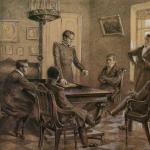Many fans of the poet will be interested in reading the verse “You walking past me” by Marina Ivanovna Tsvetaeva. This is one of her early works. It was included in the collection "Youthful Poems". In it, she writes that her life is meaningless, that no one understands her. Even in creativity, it is not possible to convey to readers everything that one would like.
The text of Tsvetaeva's poem "You walking past me" was written in 1913. At school, it is usually held in high school in a literature lesson. Also, teachers can ask him to teach completely to children by the next lesson. On our website, the verse can be read online or downloaded for free to your phone or computer.
you walking past me
To not mine and dubious charms, -
If you knew how much fire
How much wasted life
And what heroic fervor
To a random shadow and a rustle ...
And how my heart was incinerated
This wasted gunpowder.
Oh, trains flying into the night
Carrying sleep at the station ...
However, I know that even then
You would not know - if you knew -
Why are my speeches harsh
In the eternal smoke of my cigarette, -
How much dark and formidable melancholy
In my blonde head.
Marina Ivanovna Tsvetaeva
you walking past me
To not mine and dubious charms, -
If you knew how much fire
How much wasted life
And what heroic fervor
To a random shadow and a rustle ...
And how my heart was incinerated
This wasted gunpowder.
Oh, trains flying into the night
Carrying sleep at the station ...
However, I know that even then
You would not know - if you knew -
Why are my speeches harsh
In the eternal smoke of my cigarettes -
How much dark and formidable melancholy
In my blonde head.

"Youthful poems" - a collection that was never published during the life of Tsvetaeva. It includes works created between 1913 and 1915. Formally, they have nothing to do with the youthful years of Marina Ivanovna (the poetess was born in 1892). Where did such a strange name come from? The fact is that the book was compiled in the first half of 1920. By that time, Tsvetaeva had experienced a lot. In particular, the memories of the Great October Revolution were still fresh. The events that took place greatly changed the poetess. Psychologically, the period 1913-1915. seemed to her far more distant than the actual chronology testified. For fans of Marina Ivanovna, the collection is an incredible value. With its help, you can see how Tsvetaeva was looking for her own style, choosing the most suitable poetic tools for herself. The most important motives of the book are death and creativity. Interestingly, the search for individuality was characterized by a strong dependence on the intellectual trends of the early twentieth century. For example, we are talking about the enthusiasm for the ideas of the German thinker Friedrich Nietzsche.
The poem "You walking past me ...", included in "Youthful Poems", is dated May 1913. At the heart of the conflict is the total loneliness of the lyrical heroine, who opposes herself to the crowd. As a result, it is impossible for it to effectively exist in the world. Life is being wasted. There is no real use for heroic fervor. Self-expression through creativity does not bring due satisfaction, since no one is able to fully understand and feel it. Thematically, the poem “You walking past me ...” is connected with other works from the above-mentioned collection - “Go on! - My voice is dumb ... "and" Boys running briskly ... ".
Tsvetaev's life in 1913 was quite happy. She enthusiastically raised her baby daughter, her loving and beloved husband Sergei Efron lived with her, the poetess also hardly felt a lack of friends and acquaintances.

Marina Tsvetaeva, Sergei Efron, daughter of Ariadne
However, she was overcome by a vague uneasiness. Premonitions of impending misfortunes tormented Marina Ivanovna, but there was no adequate verbal expression for them. The resulting vacuum was filled with "dark and formidable anguish", attempts to predict the future. This is clearly seen both in the text under consideration and in the works directly related to it.
“You walking past me…” Marina Tsvetaeva
you walking past me
To not mine and dubious charms, -
If you knew how much fire
How much wasted lifeAnd what heroic fervor
To a random shadow and a rustle ...
And how my heart was incinerated
This wasted gunpowder.Oh, trains flying into the night
Carrying sleep at the station ...
However, I know that even then
You would not know - if you knew -Why are my speeches harsh
In the eternal smoke of my cigarette, -
How much dark and formidable melancholy
In my blonde head.
Analysis of Tsvetaeva's poem "You walking past me ..."
"Youthful poems" - a collection that was never published during the life of Tsvetaeva. It includes works created between 1913 and 1915. Formally, they have nothing to do with the youthful years of Marina Ivanovna (the poetess was born in 1892). Where did such a strange name come from? The fact is that the book was compiled in the first half of 1920. By that time, Tsvetaeva had experienced a lot. In particular, the memories of the Great October Revolution were still fresh. The events that took place greatly changed the poetess. Psychologically, the period 1913-1915. seemed to her far more distant than the actual chronology testified. For fans of Marina Ivanovna, the collection is an incredible value. With its help, you can see how Tsvetaeva was looking for her own style, choosing the most suitable poetic tools for herself. The most important motifs of the book are death and creativity. Interestingly, the search for individuality was characterized by a strong dependence on the intellectual trends of the early twentieth century. For example, we are talking about the enthusiasm for the ideas of the German thinker Friedrich Nietzsche.
The poem "You walking past me ...", included in "Youthful Poems", is dated May 1913. At the heart of the conflict is the total loneliness of the lyrical heroine, who opposes herself to the crowd. As a result, it is impossible for it to effectively exist in the world. Life is being wasted. There is no real use for heroic fervor. Self-expression through creativity does not bring due satisfaction, since no one is able to fully understand and feel it. Thematically, the poem “You walking past me ...” is connected with other works from the above-mentioned collection - “Go on! - My voice is dumb ... "and" Boys running briskly ... ".
Tsvetaev's life in 1913 was quite happy. She enthusiastically raised her baby daughter, her loving and beloved husband Sergei Efron lived with her, the poetess also hardly felt a lack of friends and acquaintances. However, she was overcome by a vague uneasiness. Premonitions of impending misfortunes tormented Marina Ivanovna, but there was no adequate verbal expression for them. The resulting vacuum was filled with "dark and formidable anguish", attempts to predict the future. This is clearly seen both in the text under consideration and in the works directly related to it.
you walking past me
To not mine and dubious charms, -
If you knew how much fire
How much wasted life
And what heroic fervor
To a random shadow and a rustle ...
And how my heart was incinerated
This wasted gunpowder.
Oh, trains flying into the night
Carrying sleep at the station ...
However, I know that even then
You would not know - if you knew -
Why are my speeches harsh
In the eternal smoke of my cigarette, -
How much dark and formidable melancholy
In my blonde head.
Analysis of the poem "You walking past me" Tsvetaeva
The poem "You walking past me ..." (1913) was included in Tsvetaeva's poetry collection "Youthful Poems", which was first published after the death of the poetess. At the time of writing the work in the life of the poetess, at first glance, everything was quite safe. She enjoyed success in literary circles, lived with a loving husband and little daughter. But already during this period, Tsvetaev’s soul was tormented by vague anxiety and a premonition of some troubles.
The central theme of the poem is the lyrical heroine's feeling of her incredible loneliness. “Walking past me” symbolizes the people around Tsvetaeva who cannot understand her soul. The work of the poetess finds her fans, but she does not believe that anyone really shares her feelings and sensations. Tsvetaeva believes that her "heroic ardor" is wasted in vain, like burnt gunpowder. People are very far from the "dark and formidable melancholy" that overwhelms the lyrical heroine. She wants to tell the whole world about her condition, but her desperate cry does not find a sympathetic response in anyone.
“Trains flying into the night” symbolize the unfulfilled dreams and hopes of the lyrical heroine. They rush past, leaving behind only bitter disappointment.
Tsvetaeva very keenly felt her individuality and "otherness" to other people. Constantly being in a state of confrontation with the whole world, sooner or later, was bound to lead to disaster. In 1913 she was still able to suppress her dissatisfaction with real life. The poetess made attempts to express herself through creativity, but they did not bring the desired result. She increasingly felt the sharp contradiction of ordinary everyday life with her ideal ideas. Over time, this gap has only widened. Tsvetaeva left her husband and returned to him again, started real and imaginary love affairs. The October Revolution significantly influenced the spiritual world of the poetess, putting her before another painful choice.
In the poem "You walking past me ..." the roots of that spiritual crisis were already laid, which led Tsvetaeva to emigration, return to the USSR and, ultimately, to suicide.




